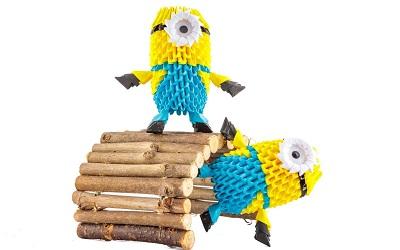You are here
- Home
- Year of Mygration
- Day 114, Year of #Mygration: Upcoming Refugee Week at The Open University
Day 114, Year of #Mygration: Upcoming Refugee Week at The Open University

Next week is the 20th anniversary of Refugee Week and The Open University is running a series of exciting events to celebrate work happening across the university on issues of migration, immigration, refugees and asylum seekers. You can see the full programme here.
As part of it, Joanne Vincett, PhD candidate at The Open University, and one of the speakers on the Refuge or Detention? panel event on Thursday 21 June, will be exhibiting art made by Chinese women detainees.
False freedom
Each year about 30,000 people go through the British immigration detention system, one of the largest in Europe and the only one with an indefinite time limit. Detainees are confined in eight immigration removal centres, three short-term holding facilities and even some prisons. About half the people detained are seeking asylum.
In Yarl's Wood Immigration Removal Centre, the main centre for detaining female foreign nationals in the United Kingdom (UK), detainees are confronted with a “false freedom”. They have freedom of movement inside the facility, but are confined to this space with little structure to their days. Uncertainty about when and how they will leave makes detention “highly affective and emotional, complex and ambiguous, unpredictable and monotonous”.
I am an ethnographer studying the voluntary organisation, Yarl's Wood Befrienders, where I am a volunteer trustee on the Board of Directors and befriender to detained women migrants and asylum seekers. Befrienders visit detainees who request volunteer visitors, known as “befrienders”, through their one-to-one visiting scheme. Once a week, volunteer befrienders visit allocated detainees in the Yarl’s Wood Visits Hall to offer emotional support as detainees cope with the challenges of “life in immigration limbo”.
A gift of art from detention
In April 2016, I began befriending detainees from China who only spoke Mandarin and rarely had visitors. Shortly after, a detainee gave me my first gift of paper folding art (also known as “origami”), a colourful pen pot.
“She smiled and had a look of pride whilst giving it to me. I said, ‘It must have taken so long to make.’ She said, ‘No, not long. About two days.’” (Fieldnotes, 10 May 2016)
It was then that I realised that our perspectives of time were completely different. To her, incarcerated for an unknown and indeterminate length of time, two days to create the pen pot was not long, but to me it was. I was impressed with her talent and patience and intrigued by the gift she proudly crafted for me.
Origami art created by detainees and intended as gifts may contribute to reaffirmation of their self-esteem. Often from positions of vulnerability and with few possessions, detainees can restore their human dignity through building their artistic capabilities, particularly within a Chinese cultural framework of gift-giving as an act of gratitude and respect for the receiver. Over the past two years I have received 49 origami artworks from women I visited, from baskets and pen pots to birds and Minions. These impressive pieces of art would have stayed hidden inside the detention centre if detainees had not given them to me or other visitors, friends and family.
The installation and artists
The artworks in this exhibit are displayed in locked metal cages, intended for small animals, symbolising the secured spaces of confinement and control where the art was produced. Art created in detention can be seen as a means of coping with anxiety and uncertainty. The practice of paper folding art may help mitigate the negative impact of an indefinite detention regime on detainees’ mental health and emotional well-being.
The artworks were crafted by five Chinese women I visited in Yarl’s Wood, one-to-one, from May 2016 to January 2018. Their duration in detention ranged from four months to fourteen months before they were removed from the UK or released. Three of them were detained multiple times, and all endured extreme distress and anxiety.
A call for change
These impressive origami artworks may have an aesthetic and emotive appeal, but the circumstances of their production demand a more urgent response. There are fundamental issues with the current immigration detention regime that impinge on human rights. The Detention Forum, a cohort of organisations working together to challenge the UK’s use of detention, believes these three changes to the system are a priority:
-
Set a time limit on detention
-
Cease the detention of vulnerable people
-
Improve the judicial oversight of detention
If you want to influence decisions on the UK system, see detention.org.uk for ways to take action and advocate for change in policy and practice. You can also learn more about the detention of migrants, asylum seekers and refugees across the world and alternatives to detention through the International Detention Coalition, idcoalition.org.
The installation will be at The Open University Library (Atrium) at Walton Hall in Milton Keynes, 18-19 June 2018, as part of the OU’s Refugee Week events organised by two OU Research Networks, International Development and Inclusive Innovation and Citizenship and Governance. Jo will host a lunchtime discussion on 19 June, 12:00-13:00 (refreshments and snacks will be served).
‘Origami Art in Immigration Detention’ is a project funded by a Santander Research and Scholarship Award. It was first curated and installed at Birkbeck, University of London, in May 2018, at a conference with the School of Law.
Quarterly Review of Research
Read our Quarterly Review of Research to learn about our latest quality academic output.

Contact our news team
For all out of hours enquiries, please telephone +44 (0)7901 515891
